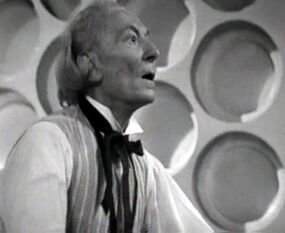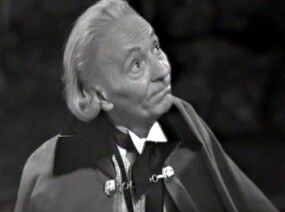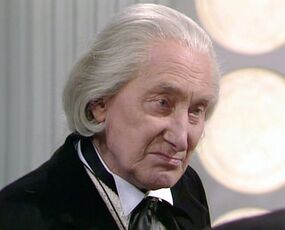First Doctor: Difference between revisions
No edit summary |
No edit summary |
||
| Line 10: | Line 10: | ||
|image2=[[Image:HurndallScowl.jpg|250px]] | |image2=[[Image:HurndallScowl.jpg|250px]] | ||
}} | }} | ||
:''"...the first; such wisdom, such intellect. But, oh, what a bore the fellow was."'' | |||
:—[[The Master]] (''[[Destiny of the Doctors]]'') | |||
A mysterious character, the '''First Doctor''' progressed from selfish anti-hero to a more noble figure, defending truth and the innocent. He was by turns casually disdainful yet formally gracious; easily exhausted while walking yet almost gleeful during a physical confrontation; seemingly wise yet prone to mistakes borne of arrogance and rash judgment. He was in short a young man in an old man's body. | A mysterious character, the '''First Doctor''' progressed from selfish anti-hero to a more noble figure, defending truth and the innocent. He was by turns casually disdainful yet formally gracious; easily exhausted while walking yet almost gleeful during a physical confrontation; seemingly wise yet prone to mistakes borne of arrogance and rash judgment. He was in short a young man in an old man's body. | ||
Revision as of 02:54, 30 June 2008
- "...the first; such wisdom, such intellect. But, oh, what a bore the fellow was."
- —The Master (Destiny of the Doctors)
A mysterious character, the First Doctor progressed from selfish anti-hero to a more noble figure, defending truth and the innocent. He was by turns casually disdainful yet formally gracious; easily exhausted while walking yet almost gleeful during a physical confrontation; seemingly wise yet prone to mistakes borne of arrogance and rash judgment. He was in short a young man in an old man's body.
Speaking of his first incarnation, the Tenth Doctor confirmed the dichotomous nature of the First Doctor by saying to his fifth self:
- "Back when I first started at the very beginning, I was always trying to be old and grumpy and important — like you do when you're young." (DW: Time Crash)
Biography
Self-exile from Gallifrey

The Doctor lived originally on Gallifrey, home planet of the Time Lords. Though he kept his reasons for leaving vague when asked, implying that he could not go back, even if he chose (DW: An Unearthly Child), in fact, he had chosen to steal a Type 40 TARDIS and travel throughout space and time. (DW: The War Games).
One depiction shows the Doctor and Susan Foreman fleeing through a corridor with an explosion occurring at this time. Interestingly, this scene also depicted the Doctor and Susan already dressed in 20th century Earth clothing (DWM: Time & Time Again).
- Other accounts differ to a greater or lesser degree. By the time that the Doctor and Susan had landed in London, the travellers had already experienced a number of adventures.
Life on Earth
For five months, Susan and the Doctor lived in 1963 London to enable Susan to complete her education and so that the Doctor could find some missing components for the TARDIS (DW: An Unearthly Child); as later revealed, he was also finding a hiding place for the Hand of Omega, although this fact was not obvious at the time (DW: Remembrance of the Daleks).
By this time, a Dalek had already discovered him. The Doctor's seventh incarnation also appeared in his past self's life on a mission from the White Guardian, to steal the TARDIS Instruction Manual. (DWM: Time & Time Again)
Two teachers Barbara Wright and Ian Chesterton from Coal Hill School, tracked Susan down to a junkyard in 76 Totter's Lane, where the Doctor and Susan had left the TARDIS. Unable to know what to do, the Doctor kidnapped the teachers. The TARDIS dematerialised and landed in 100,000 BCE. (DW: An Unearthly Child)
Other travels
The Doctor remained unable to effectively pilot the TARDIS. Subsequently, the Doctor, Susan, Ian Chesterton and Barbara Wright travelled throughout the Universe, trying to find a way back to 1963 Earth.
In London during the time of the 22nd century Dalek invasion, Susan met David Campbell, a young resistance fighter against the Daleks. Recognising that Susan had matured from girl to woman, the Doctor left her behind. (DW: The Dalek Invasion of Earth)
Subsequently, the Doctor helped people in need and fighting such alien enemies as the Daleks (again), Zarbi (DW: The Web Planet) and Cybermen (DW: The Tenth Planet).
Regeneration
He apparently succumbed to old age after his first meeting with the Cybermen, stating that "this old body is wearing a bit thin." Fortunately, the Doctor was able to return to the TARDIS in time to begin the regeneration process, transforming him into a new, younger body. (DW: The Tenth Planet)
Characteristics
Appearance
It is unclear what the First Doctor appeared like in his youth.
However, in his later life, the First Doctor resembled a humanoid male of advanced years, with shoulder length, greyish-white hair. He had piercing brown eyes.
The Doctor affected a slightly eccentric Edwardian dress sense, wearing a frock coat and tartan trousers. Occasionally he wore an Astrakhan (DW: An Unearthly Child, The Tenth Planet) or a Panama hat (DW: The Chase, The Daleks' Master Plan). He also sometimes wore a cape (DW: Planet of Giants, The War Games). He had reading glasses and used a walking stick which made an effective weapon. (DW: The Chase) The Doctor wore a blue signet ring which had special powers. (DW: The Daleks' Master Plan)
This version of the Doctor, in contrast with most that followed, tended to make at least subtle, but often gross, changes to his attire when in Earth's past. In almost every one of his historical stories, he made at least slight alterations to his "standard" wardrobe to make it easier to fit in with the local society, as when he wore a cowboy hat in nineteenth century Arizona. (DW: The Gunfighters)
Personality
During this phase in his life, the Doctor was irascible, a brilliant but often short-tempered scientist. He refused to bend his knee to the Kublai Khan, giving rheumatic knees as the reason. (DW: Marco Polo). He would get particularly snappish with those who doubted the TARDIS could actually travel through space and time. He had no problem hitting a Viking when his own life was threatened. (DW: An Unearthly Child, DW: The Time Meddler)
At first he had a particularly selfish and duplicitous attitude. Having contempt for mere humans, he regarded them as primitives. He abducted Barbara and Ian against their will and set the TARDIS console to shock Ian into unconsciousness. Arguably, he even contemplated killing the mortally wounded Za so that he would not slow down the Doctor's party. (DW: An Unearthly Child) The Doctor also deliberately removed the TARDIS' fluid link so that he would have an excuse to explore the Dalek City on Skaro. (DW: The Daleks)

Especially as time went on, however, he displayed great wisdom and a kind heart. Perhaps due to his age, he seemed frailer than his later incarnations. He also appeared somewhat absent-minded, but this may have been exaggerated to make his enemies underestimate him. The Doctor would, when pressed, resort to fisticuffs with an effectiveness which belied his age. (DW: The Romans, DW: The Chase) He claimed that a professional wrestler, the Mountain Mauler of Montana had taught him some effective moves. (DW: The Romans)
Unlike his successors, he was often as reliant upon his companions as they were upon him -- many times it was Ian or Steven who saved the day. Nonetheless, the First Doctor possessed an aura of power and intelligence which was impossible to ignore.
He often returned to Earth at various times in its history, apparently motivated by historical curiosity rather than a desire to preserve it against alien invaders. On his voyages to other planets, he was again motivated as much by curiosity as by a desire to help them.
The Master complimented this Doctor's wisdom and intellect, but also commented on "what a bore the fellow was". (Destiny of the Doctors)
Habits and Quirks
The First Doctor punctuated his speech with, "Hmmmm...?", exasperated sighs and snorts and the occasional mangled phrase or word. He would address young women as "child" and younger men as "my boy" or in Ian's case by his name. However, he found it difficult (or pretended to find it difficult) to remember Ian's last name.
The TARDIS required expert piloting and guidance by the Doctor. This would explain the difficulty the Doctor encountered in returning to 1963 London in order to return Ian and Barbara to their lives. The Doctor consulted a small handbook.
The Doctor never even hinted at the nature of his own origins, other than to state that he and the Monk originated on the same world and to hint that Susan and himself were exiles from the same place and time. (DW: An Unearthly Child)
Mysteries and Discrepancies
Family and relationship to Susan
In most accounts, Susan is unambiguously the Doctor's granddaughter, as stated in An Unearthly Child.
This notion would seem to carry through to the Tenth Doctor, who has alluded to this and other familial relationships. He mentions being "a father once" in Fear Her. In Smith and Jones, he makes a fleeting reference to not having a brother "anymore". He told Sally Sparrow that he was "rubbish at weddings, especially [his] own." (DW:Blink) And he told Donna Noble that he had fathered children before and had a family (DW: The Doctor's Daughter).
The notion of traditional, Human-like families is directly challenged the the account given in Lungbarrow. There, Susan is flatly stated to be unrelated to the Doctor. Furthermore the nature of Time Lord reproduction is said in this account to be such that traditional Human labels of "mother", "father", "sister" and "brother" do not apply.
Whatever their relation, the Doctor clearly treated her with greater affection than other companions. When it appears that he will be traveling alone now, he referred to her as "my little Susan" in a soliloquy in which he names all his previous companions (DW: The Massacre)
When she appeared lost in Revolutionary France, the normally commanding incarnation is visibly shaken and must be calmed by Ian. Meanwhile, he offers Barbara — who is in equal peril — a mumbled "be careful" while rushing off to find Susan. (DW: The Reign of Terror)
The manner of her departure is equally unusual. She is to date the only companion to be physically locked out of the TARDIS, and the only companion whom the Doctor chose not to say goodbye to in person, when he had the ability to do so. (DW: The Dalek Invasion of Earth). She is one of the few original series companions whose departure moved him to a state of emotional discomfort seen in later episodes. (DW: The Rescue)
The Daleks
The First Doctor seemed unfamiliar with the Daleks (DW: The Daleks), even though he had, we would learn later, hidden the Hand of Omega away on 1963 Earth, as part of an ongoing plan to defeat them. (DW: Remembrance of the Daleks)
- It is never explicitly stated that the First Doctor had this plan in mind when he took the Hand to Earth. It is more likely that the plan occurred to him later in his travels, after he became familiar with the Daleks.
Other issues
- In the course of his first adventure with Ian and Barbara, the Doctor smokes a pipe (DW: An Unearthly Child). We have never seen him smoke on any other occasion.
- When the First Doctor, Vicki, Barbara and Ian were being chased by the Daleks through time, he claimed to have built the TARDIS. (DW: The Chase) This statement stands in stark contrast with later incarnations, who have variously claimed that the TARDIS was stolen (EDA: The Gallifrey Chronicles), or that it was grown, rather than built (DW: "Rise of the Cybermen, The Impossible Planet). While the TARDIS could have been both grown and stolen, it is difficult to see how it could also have been built by the Doctor.
- The computer WOTAN referred to the Doctor as "Doctor Who", the first and only time, so far, we have heard the Doctor so described on television. (DW: The War Machines) However, it was commonplace for writers of the Polystyle comic strips featuring the First through Fourth Doctors to consider the character's name "Dr. Who". Moreover, this convention was so widespread that editors of Doctor Who Classic Comics gave John the last name "Who".
- The First Doctor appeared, unlike the Third Doctor and later Doctors, to have one heart, rather than two hearts, at least as far as a cursory medical examination by Ian revealed. (DW: The Edge of Destruction). However, some speculate that Time Lords develop their second heart during their first regeneration. (MA: The Man in the Velvet Mask) On the other hand the Doctor's second heart maybe have temporarily stopped due to illness or shock as shown with later Doctors.
- There is every indication that the first incarnation of the Doctor is the longest-lived of all his incarnations to date, based upon a statement by his second incarnation a few months after his regeneration that he was 450 years old at that time (DW: The Tomb of the Cybermen). By the time of his regeneration into his Seventh incarnation, he is said to be 953, (DW: Time and the Rani) suggesting approximately 500 years divided among incarnations Two through Six. (The rationale for his ninth and Tenth incarnations claiming a younger age of only 900 to 903 (DW: Aliens of London, Voyage of the Damned, etc.) is unclear.)
Key Life Events
- Exiled (or escapes from) Gallifrey with his granddaughter, Susan, and a TARDIS. (DW: An Unearthly Child)
- Arrives on Earth in 1963 and sets up a home in London, hiding the TARDIS in a scrapyard. (DW: An Unearthly Child) During this time, the Doctor hides the Hand of Omega (DW: Remembrance of the Daleks)
- Kidnaps Ian Chesterton and Barbara Wright and takes them away from earth. (DW: An Unearthly Child)
- Meets the Daleks for the first time (DW: The Daleks)
- Begins to accept the idea of travelling with non-Gallifreyan companions. (DW: The Edge of Destruction, et al)
- After defeating a Dalek invasion of earth, leaves Susan to live out her life in the 22nd Century (DW: The Dalek Invasion of Earth)
- Gains a new companion, Vicki (DW: The Rescue)
- Returns Ian and Barbara to their homeworld and era, having long made peace with them for kidnapping them; immediately gains a new companion in Steven Taylor. (DW: The Chase)
- Through Time Lord intervention, encounters future incarnations of himself on at least two occasions. (DW: The Three Doctors and The Five Doctors)
- Encounters The Meddling Monk, another Time Lord, for the first time. (DW: The Time Meddler)
- Vicki leaves to make her place in human history; Katarina, believing the Doctor to be a god, joins him in his travels. (DW: The Myth Makers)
- During a single tragic adventure, suffers the death of two companions, Katarina and Sara Kingdom. (DW: The Daleks' Master Plan)
- Relationship with Steven Taylor begins to break down, with Steven leaving the TARDIS in anger, only to soon return. Dodo Chaplet accidentially joins the TARDIS crew. (DW: The Massacre of St Bartholomew's Eve)
- Steven Taylor leaves the TARDIS, this time for good, in order to help rebuild a civilization. (DW: The Savages)
- Dodo Chaplet is forced to stay on Earth due to injury; the Doctor gains two new companions, Polly and Ben Jackson (DW: The War Machines)
- Meets the Cybermen for the first time, an encounter that physically drains the increasingly frail Doctor. (DW: The Tenth Planet)
- Collapses in the TARDIS and regenerates for the first time. (DW: The Tenth Planet)


